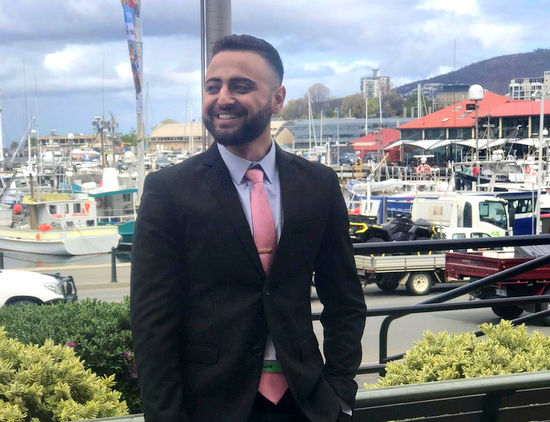New Research Shows Social Networks Provide Refugees with Significant Foundations for Belonging
New research by Settlement Services International (opens in a new window)and the Institute for Culture and Society, Western Sydney University, challenges narrow economic definitions of successful refugee settlement and, instead, suggests social and civic dimensions are equally valid markers of refugee integration.
Foundations for Belonging: A snapshot of newly arrived refugees (opens in a new window), to be launched during Refugee Week on June 18, reveals that refugees are building mixed social networks, which helps them to trust Australian institutions and fulfil social responsibilities.
The research examines social and civic dimensions such as social bonds, social bridges, social links and rights and responsibilities from the perspectives of refugees themselves and their everyday experiences of welcome, participation and belonging in the early stages of settlement.
It points to a series of actions that governments, policymakers, service providers and civil society can pursue to strengthen their contribution to settlement and integration.
SSI CEO Violet Roumeliotis said, “It is fitting that, in a Refugee Week with the theme ‘Celebrating the Year of Welcome’, this study shows that refugees have a strong sense of welcome and belonging in their everyday lives.
“They feel part of the Australian community, regularly seek to get to know people from cultural backgrounds other than their own, demonstrate high levels of trust in their neighbours and neighbourhoods, and, despite language barriers, are developing social bridges grounded in the sense of welcome and support offered by the broader Australian community.
“This research will provide a solid foundation for community engagement initiatives that facilitate meeting and exchange between receiving communities and refugees.”
Western Sydney University Associate Professor Shanthi Robertson said, “Our new research shows that everyday, commonplace encounters with service providers, neighbours, friends and other members of the community can play a critical role in the belonging and integration of newly arrived refugees.
“These small daily encounters shape the trust and responsibility that refugees feel towards Australian society more broadly. Many Australians support the refugee program. Now individuals, government agencies and services providers can discover what simple actions they can take to support newly arrived refugees in their community.”
Meet Abdallah Al Tibi

When Abdallah Al Tibi and his family had packed their belongings in 2012 to seek temporary refuge from Syria in bordering Jordan, they did not anticipate that they’d never return, and packed for only two weeks.
The Al Tibi family were among the earliest groups of Syrians to flee the war as the city of Daraa had been one of the first areas of Syria to be under attack.
“It was like a horror movie; during that time, we were often unable to leave school if the area was under attack; it was very stressful,” Mr Al Tibi said.
Mr Al Tibi spent three years in limbo in Jordan before his family had been granted their humanitarian visas to Australia in 2014.
When the Al Tibi family were given the news that they were being resettled in Australia, Mr Al Tibi said they were overwhelmed with a sense of relief.
“We knew it was a life-changing opportunity, and as we are a family of high achievers, we put double the effort to learn English when we arrived.”
Arriving in Sydney airport in December of 2014, the Al Tibi family were greeted by Settlement Services International (SSI), who provided with them with wrap-around case management services, including finding temporary accommodation.
Today, members of the Al Tibi family have demonstrated their desire to succeed in their new home with most of the siblings either completing degrees or with degrees in hand.
Mr Al Tibi is completing his Bachelor of Social Work at Western Sydney University (WSU) while working at MYAN in community outreach and SSI as a part-time bi-lingual guide.
He has also been able to expand on his data analysis skills with the opportunity to become a peer researcher in a person-centred project led by the NSW Coordinator General for Refugee Resettlement, Peter Shergold.
Mr Al Tibi said, “Having permanent residency has provided us with equal opportunities that would otherwise have not been accessible.
“As refugees, we have a strong drive and commitment to contribute to the community we live within, driven by an appreciation for the second chance we have been given at life.
“I think refugees are welcoming of others’ cultures and experiences because we value the adversity in everyone’s journey as we reflect on the difficulty of our own.”
Launch
Foundations for Belonging will be launched at a virtual event hosted on Zoom by Australia at Home (opens in a new window)on June 18, 1-2pm, during Refugee Week (Sunday June 14 to Saturday June 20).
Refugee Week aims to create better understanding between different communities and to encourage successful integration enabling refugees to live in safety and to continue making a valuable contribution to Australia.
The launch will feature a panel discussion moderated by ABC News reporter Lydia Feng, with research co-author and Western Sydney University Senior Research Fellow Shanthi Robertson, SSI Settlement Services Manager Dor Achiek and Refugee Council of Australia Policy Officer Shufuka Tahiri.
The discussion will be preceded by a presentation of the research findings by the paper's co-authors Tadgh McMahon, SSI Research and Policy Manager, and Shanthi Robertson. The launch event will also include a Q&A.
Media Enquiries
Media release issued by Settlement Services International (opens in a new window)
Posted: 18 June 2020.




